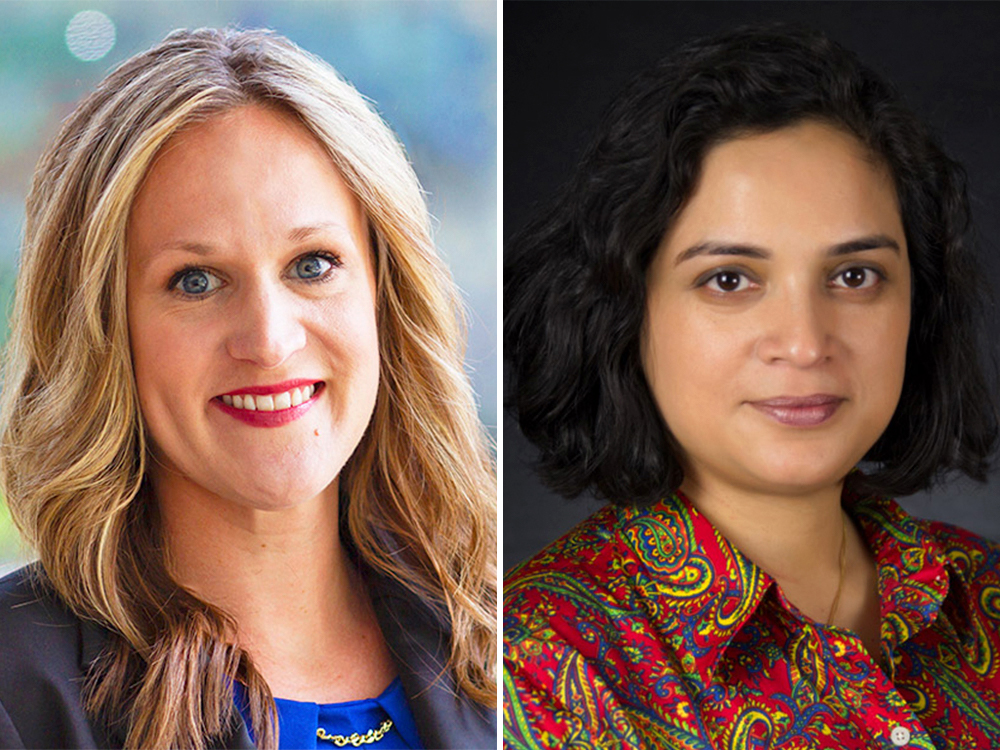Biology Camps Help Give Life to Next Generation’s College Dreams
08.16.2021
The University of Texas at Dallas Undergraduate Success Scholars (USS) program focuses on ensuring underrepresented students achieve all they can, both academically and personally. Now, thanks to its supportive faculty partners, the program has found a new avenue for giving back to the community and lifting up the next cohort of students.
This summer, USS allied with Harmony Public Schools, a network of public charter schools in Texas, to offer online biology camps to middle school and high school students at Harmony School of Innovation – Garland. In the process, USS students discussed with a younger wave of children with backgrounds similar to their own how they, too, can succeed and continue into higher education.
 From left: Courtney Brecheen MPA’09, PhD’17, senior associate dean in the Office of Undergraduate Education, and Dr. Meenakshi Maitra, senior lecturer in the Department of Biological Sciences.
From left: Courtney Brecheen MPA’09, PhD’17, senior associate dean in the Office of Undergraduate Education, and Dr. Meenakshi Maitra, senior lecturer in the Department of Biological Sciences.
“Representation is an important, often overlooked part of a student’s learning process,” said Courtney Brecheen MPA’09, PhD’17, senior associate dean in the Office of Undergraduate Education, which oversees the USS program. “When these younger students can see themselves in a current college student, it removes one more barrier to continuing their education.”
A majority of USS participants come from minority communities, and 40% are first in their families to complete a four-year degree. Created in 2014, the program now supports more than 300 UT Dallas students.
Dr. Meenakshi Maitra, senior lecturer in the Department of Biological Sciences in the School of Natural Sciences and Mathematics, was approached about the demand for biology and health care-related camps for Harmony students to supplement existing computer science camps overseen by UT Dallas’ Department of Computer Science. Maitra serves as a mentor in the USS program and coordinates the program’s Transfer Research Initiative.
“We saw it as an excellent opportunity for USS participants to serve our local community,” Maitra said.
In total, 65 Harmony students attended the camps, which covered science first, followed by conversations with USS mentors who shared their experiences.
“The biology topics took up two hours each day, and the third hour was an open forum for those who wanted to stay beyond for questions about broader issues,” Maitra said. “Those questions were mainly about careers and higher education: ‘How do you apply to go to UT Dallas,’ and so on.”
“It was very encouraging for me to teach in the way I wish I was taught at that age.”
– Rafiki Niyibizi BS’21
Recent UT Dallas biochemistry graduate Rafiki Niyibizi BS’21 served as a family leader within USS — a mentor to younger USS students — and as one of the USS teachers for the virtual camps.
“These middle school and high school students may have some notions about biology topics already, but they are getting both more details and a bigger picture, though we still only scratch the surface,” he said. “I think that can increase their curiosity.”
Niyibizi, who plans to apply to medical school, relished his first opportunity at teaching such an audience.
“It was very encouraging for me to teach in the way I wish I was taught at that age,” he said. “I hope that these camps encouraged them to go further in their learning, having seen a bit of what will be next.”
Maitra and Brecheen expressed hopes that the program can grow beyond the initial summer camps, perhaps getting USS students involved as teachers and role models throughout the school year.
“Our students are the living, breathing benefit of the investment in diversity, equity and inclusion,” Brecheen said. “It’s our mission to reinforce those characteristics in a way that’s mutually beneficial for the institution, for our community pipeline of prospective students and for the personal development of our current students.”
Maitra added: “Our goal as educators at UT Dallas is to foster communication between our students and the larger community. We need as much support as possible to ensure that this goal is achieved.”
–Stephen Fontenot
Tags: Outreach, Undergraduate Success Scholars